|
With the rise of motorized transport and fighting vehicles in the 20th century, the need to carry extra fuel, lubricants
and water with the vehicle became a must. Early containers were not much different than their commercial counterparts used in the civilian world, and remained so
until the advent of the German jerrycan (Wehrmacht-Einheitskanister) in 1937. The jerrycan was so well designed that once other armies encountered it they used whatever
cans they could capture and proceeded to design similar cans. To this day modern fluid containers are not much
different other than being made from plastic.
Now, I have to admit that I'm not very knowledgeable about flimsies, POW/POL cans, and have just a passing knowledge of jerrycans. My research has not found
a definitive definition nor a definitive set of dimensions for flimsies and POW/POL cans. So I'll just preview the sets below with regards to what is provided
in the sets. I would love to hear from anyone able to provide some definitive answers regarding flimsies and
POW/POL cans.
Tin Flimsies (72-009)
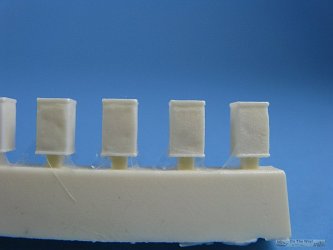
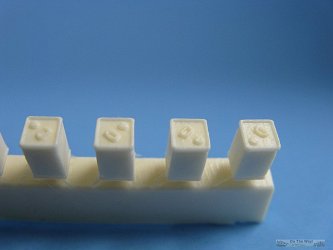
This set comes with 10 cans in two styles cast in pale yellow resin on a single block. Four cans come with smooth sides and lips around the perimeter of
the top and bottom ends. The remaining six
cans have lips around the perimeter of the top and bottom ends as well as along the vertical edges of the can's sides. On the top is a molded on spout and D-ring handle.
The resin is a bit rough and could use some sanding. The can sides also show some slight unevenness which I will assume is an attempt at replicating a bulged can that's
filled with fluid.
Measured with my dial calipers their dimensions
are: height = .210in: width =.130in: depth = .130in, which makes makes them just over 15in by 9in by 9in, which closely matches the dimensions
for a 4 gallon (Imperial gallon I assume) can found in reference [5].
POW Cans (72-010)
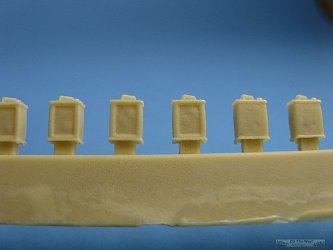
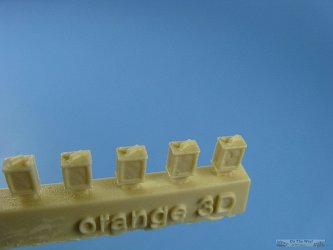
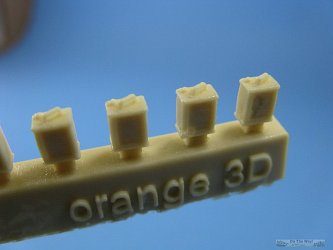
Like the flimsy set above, this set comes with 10 cans in two styles cast in pale yellow resin on a single block. Four cans come with smooth sides and
lips around the perimeter of the top and bottom ends. The remaining six cans have lips around the perimeter of the top and bottom ends as well as along the
vertical edges of the can's sides. On the top is a molded on spout and U-shaped handle. With some care, the area between the handles and the top of
the can, can be removed with the tip of a sharp hobby blade. The cans would benefit from some
photo-etched handles, and given o3d miniatures' skill with photo-etch it is somewhat surprising that separate handles are not included with this set.
The resin is a bit rough and could use some sanding. One of my cans has a noticeable void on its side. The can sides also show some slight unevenness which
I will assume is an attempt at replicating a bulged can that's filled with fluid.
Measured with my dial calipers their dimensions
are: height = .16in: width =.13in: depth = .085in, which makes makes them around 11.5in by 9in by 6in. They look very much like the cans found in reference [6], which
unfortunately doesn't provide dimensions.
Modern US Jerricans (72-011)
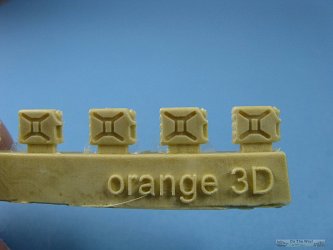
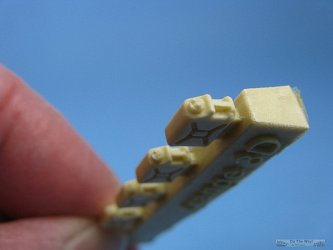
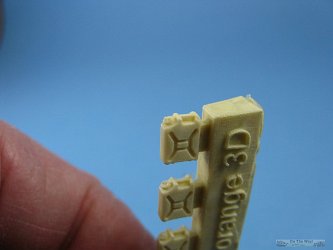
Looking much like their World War Two German ancestors, the modern American jerrycan is now manufactured in plastic to save weight, make them
rust resistant, and less susceptible to
exploding when hit in combat. They have embossed on their sides a rounded rectangle indicating water,
and an oval for fuel and other poisonous fluids (you can see the oval markings in the picture at the head of the page). The colour of the plastic
is also used to
indicate what type of fluid is inside. According to reference [3] water cans
have a single bar handle and fuel cans have the traditional three bar handle, which this set correctly depicts. On the bottom of the water cans are 6 small round
bumps (see the above left picture). The resin is a bit rough and could use some sanding.
Apparently these cans are also used by the Canadian armed forces so they should be valid for Canadian vehicles.
Measured with my dial calipers their dimensions
are: height = .26in: width =.19in: depth = .09in, which makes makes them around 18.7in by 13.7in by 6.5in. I can only assume that the cans are
correct dimension wise.
Conclusion
All three sets make a good starting point for those wanting to add storage to their vehicle or diorama.
References
[1] Track48 forum thread
[2] Sun Compass
[3] Olive-drab.com
[4] Wikipedia
[5] G503.com (G503 Military Vehicle Message Forums)
[6] ww2jerrycans.com
[7] 42fordgpw.com (can content tags - not really relevant to the sets in this preview but interesting nonetheless)
[8] missing-lynx.com (Allied WWII AFV Discussion Group)
[9] prep and more
Preview sample supplied by Sonny Sy of o3d miniatures.
o3d miniatures products are available at

|